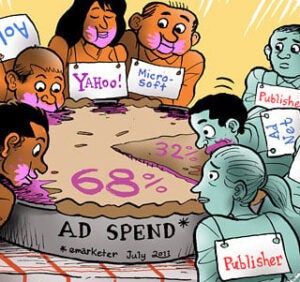 Publishers are going to be shouldering the bulk of the burden of the user consent policy Google announced Monday.
Publishers are going to be shouldering the bulk of the burden of the user consent policy Google announced Monday.
Google, in an effort to proactively comply with upcoming EU data protection legislation, outlined a user consent policy requiring publishers using AdSense, DoubleClick Ad Exchange or DoubleClick for Publishers to add cookie notifications across desktop, mobile and mobile apps for EU users.
Publishers must notify EU users about the use of cookies on a site. They don’t need to provide an opt-out.
“European Union data protection authorities requested some changes to current practices for obtaining end-user consents,” said Jason Woloz, Google’s security and privacy program manager, in a blog post.
Woloz was referring to requirements that will appear in updated cookie legislation that haven’t passed yet, but should be finalized early next year.
“It’s too early to tell if these changes will fully satisfy EU lawmakers since the final draft has yet to be released or adopted,” said Rob Rasko, CEO and founder of publisher consultancy 614 Group. Taking a forward approach is a “wise course” for Google, Rasko said.
But Google’s user consent law unleashes a huge headache for publishers – and Google, which needs publishers to comply in order to continue to use cookies to target users.
Reaction to the announcement from the publisher community was overwhelmingly negative. All of the comments on Google’s blog post, as of this writing, disparaged the decision and EU policies. Based on the Google+ profiles of commenters, many of the critiques came from smaller AdSense publishers, for whom the burden of implementation will be greatest.
“The fact that Google now decides to force this upon all its customers, many of them smaller websites relying on long-tail traffic through AdSense, is heavy,” said Matt Prohaska, CEO and principal of Prohaska Consulting.
The same criticism holds for the EU’s legislation attempt.
“These moves by Google are a clear, timely and relevant example of our belief that ‘blanket’ solutions to complex digital challenges in this area are difficult to reach consensus on,” Rasko said.
The EU doesn’t think about data privacy any differently for health records or personalization cookies, Rasko said: “Treating all data as equal is unrealistic and unfeasible from an EU regulatory point of view.”
Publishers, unhappy as they may be, don’t have much of a choice to comply, unless they can afford to block EU traffic.
Although just 5% of its traffic comes from the EU, complying with Google’s requirement is a given for educational publisher StudyBreak Media.
“Because Google is such an important partner and we want to provide our service to everyone that needs it, we’ll acquiesce as soon as we can figure out what exactly is required,” said company director Emry Downinghall.
But the interruptive nature of user consent notifications means proper implementation is critical.
“Direct permission from users will have an impact on the UX [user experience],” Downinghall said.
Publishers need to consider the nuances as well. For example, can the page (and advertisements) load and drop cookies before users accept the cookie notification?
Early versions of EU’s previous cookie law, which applied to EU publishers, required a pop-up before content rendered. An example of this approach exists on Netherlands publisher Telegraaf.
“This [pop-up] approach seems relatively harmless for big publishers with a strong existing brand and relationship with its users, but smaller publishers who actively optimize each page in their funnel and need to minimize path to content/conversion might see a (significant) drop in performance on reaching new users,” Prohaska said.
But a small header notification (as on Tesco’s site) would have minimal impact and be unlikely to affect a publisher’s bounce rate.
A Google spokesperson said its policy does not specify if publishers need to obtain consent before dropping cookies.
Google also left notification language up to publishers in its website cookiechoices.org, which will help publishers make the switch. But that, too, can be highly subjective.
Some EU publishers have created notifications inform users that their cookies are used to improve site navigation. Given their many other uses, that disclosure can be highly misleading.
While Google suggested in its blog post that publishers start working “today,” it will not enforce the new policies until September 30.















